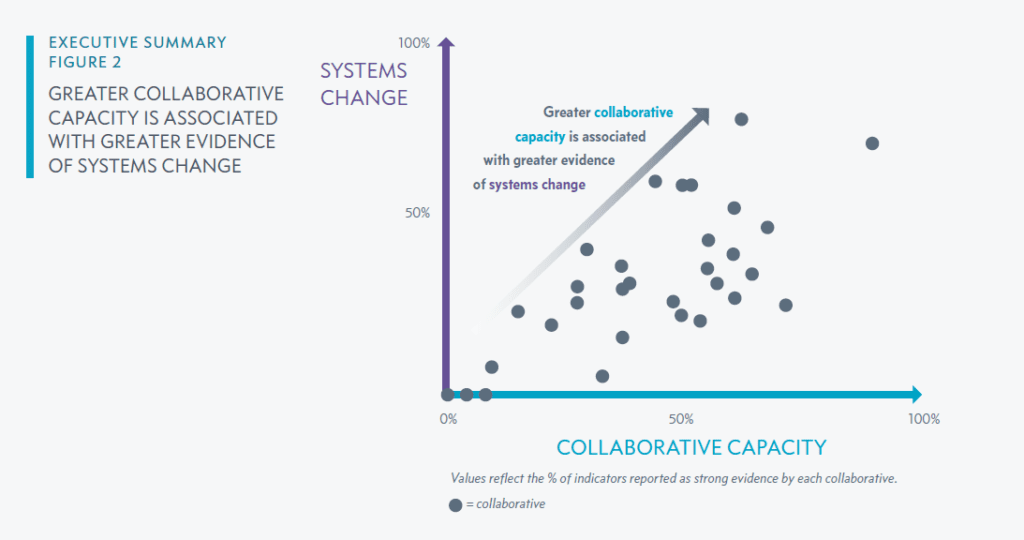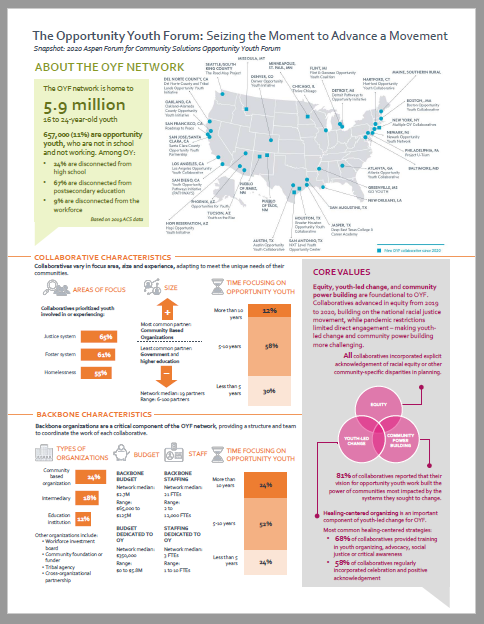In 2012, Aspen Institute Forum for Community Solutions launched what is now the Opportunity Youth Forum. In 2020, the OYF Network expanded by seven communities to 33 across 19 states, each “seeking to scale multiple reconnection pathways that achieve better outcomes in education and employment for opportunity youth.” Read more about our partnership.
In 2020, Equal Measure conducted its fifth annual evaluation to explore the status of the OYF Network and the communities in which they operate to better understand areas of strength and opportunities for additional focus and learning. This report details network-wide findings drawn from data collection among 30 of 33 communities participating in the OYF Network in 2020.
The events of 2020 acutely affected the work of the OYF Network’s collaboratives. Partners adopted new youth engagement and recruitment strategies, as many models relied on in-person program delivery. Program providers shifted their focus to address the immediate and pressing concerns faced by families affected by the pandemic, supporting emergency relief efforts including food distribution, housing stability, laptop and wireless hotspot provision, and pandemic-related information and resources. Organizations adapted to a rapidly changing funding landscape. Backbone organizations found new ways to convene and organize community partners from the public and private sectors in supporting youth amid the uncertainty.
Despite these adjustments, the OYF Network persisted. Collaboratives, backbones, and partner organizations adapted. Several collaboratives prioritized flexibility. Others championed stability. New priorities were elevated, while some initiatives were put on hold. Regardless of approach, the OYF Network’s ways of working were influenced by the demands of the moment. However, its steadfast commitment to young people never wavered.
Greater Capacity and Systems Change
The OYF model is anchored by the belief that OYF communities will be able to connect (and reconnect) more young people to school and work as they make gains across all three domains: collaborative capacity, systems change, and core values.
For the second consecutive year, collaboratives with greater capacity are statistically more likely to see greater evidence of the systems change necessary for opportunity youth to succeed. This finding reinforces the notion that investing in collaboratives—increasing their resources, building their data infrastructure, boosting the capacity of personnel—can lead to sustainable improvements in youth outcomes.

Embedding Core Values
Equity, youth-led change, and community power building are core values of the OYF, and are embedded across its efforts to build collaborative capacity, improve local systems, and build pathways to reconnect youth to education and employment. While the network continues to commit to these values, the backdrop of 2020—including the COVID-19 pandemic, increased attention on systemic racism, and political and economic turbulence—influenced the ways collaboratives incorporated these values into their work.

Read the full report here.
